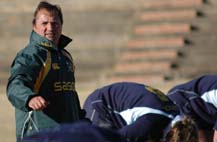Latest News Archive
Please select Category, Year, and then Month to display items
12 October 2020
|
Story Arina Engelbrecht
|
Photo Supplied
 Arina Engelbrecht from Organisational Development and Employee Well-being believes physical activity has a number of benefits for one’s health, including stress relief.
Arina Engelbrecht from Organisational Development and Employee Well-being believes physical activity has a number of benefits for one’s health, including stress relief.
Being physically active plays a big role in preventing the development of mental-health problems and in improving the quality of life of people experiencing mental-health problems.
Treatment for depression
Physical activity can be an alternative treatment for depression. It can be used as a stand-alone treatment or in combination with medication and/or psychological therapy. It promotes all kinds of changes in the brain, including neural growth, reduced inflammation, and new activity patterns are formed that promote feelings of calm and well-being. It releases endorphins – powerful chemicals in the brain that energise your spirit and make you feel good.
Physical activity can be very effective in relieving stress. Research in adults has found that physically active individuals tend to have lower stress levels compared to individuals who are less active. It also leads to improved sleep. When a person sleeps better and feels more rested, overall quality of life improves. They cope better with daily life stressors.
Reduce Alzheimer's risk
Regular physical activity can reduce your risk of developing Alzheimer's disease by up to 50%. It can also slow down further deterioration in those who have already started to develop cognitive problems. It stimulates the brain’s ability to maintain old connections as well as to make new ones.
A study asked people to rate their mood immediately after periods of physical activity (e.g. going for a walk/run, cycling, doing housework) and periods of inactivity (e.g. reading a book or watching television). Researchers found that participants felt more content, more awake, and calmer after being physically active compared to after periods of inactivity.
In conclusion, people who are physically active feel a sense of well-being, feel more energetic throughout the day, sleep better at night, have sharper memories, and feel more relaxed and positive about themselves and their lives.
“Being physically active not only changes your body, it changes your mind,
attitude, and your mood.” – Arina Engelbrecht
Three more Kovsie staff members involved in Olympic Games
2012-05-30
 |
|
Dr Derik Coetzee
Photo: Supplied
30 May 2012
|
The South African men’s hockey team will practice on our Bloemfontein Campus from 28 May to 8 June 2012, and the team count on the assistance of three Kovsies to prepare them for the Olympic Games taking place in London later this year.
Dr Derik Coetzee, senior lecturer in the Department of Exercise and Sport Science and Head of our High Performance Centre, has been appointed conditioning coach of the team. He will be assisted by Colleen Jones and Riaan Schoeman, also from this department.
The UFS team and Mr Gregg Clark, the team’s coach, will work out a periodisation programme for the team, which will continue until the hockey finals at the Olympic Games. The programme includes the correct exercises, volume, intensity and number of exercise sessions per week.
This is not the first time that Dr Coetzee has assisted sports teams to prepare for important events. In 2007, he was the conditioning coach of the Springbok rugby team that won the World Cup in France. He was also the conditioning coach of the under-21 Springbok team in 2002 that won the Junior World Cup Tournament.
Dr Coetzee says it is a challenge to ensure that the team performs well at the Olympic Games. “The joy on the faces of the coach and players when they qualified in Japan cannot be described because many people thought they would not qualify.”
With the addition of Dr Coetzee, Ms Jones and Mr Schoeman, a total of six staff members from the UFS will be involved with the Olympic Games and the Paralympic Games. The other three are:
- Dr Louis Holtzhausen, Head of the university’s Department of Sports and Exercise Medicine, has been selected as team doctor for the more than 300 athletes that will represent South Africa at this year’s Olympic Games (in London).
- Ms Ebeth Grobbelaar, Assistant Director of the South African Testing Laboratory for Prohibited Substances at the UFS, was invited to be involved in the Drugs Control Centre in the unit against prohibited substances which will test sportsmen and -women during the games.
- Ms Hetsie Veitch, Head of the Unit for Students with Disabilities, has been invited to be a member of the Classification Panel at the final USA Paralympic athletics trials.